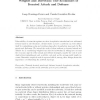Free Online Productivity Tools
i2Speak
i2Symbol
i2OCR
iTex2Img
iWeb2Print
iWeb2Shot
i2Type
iPdf2Split
iPdf2Merge
i2Bopomofo
i2Arabic
i2Style
i2Image
i2PDF
iLatex2Rtf
Sci2ools
CN
2011
2011
Decapitation of networks with and without weights and direction: The economics of iterated attack and defense
Vulnerability of networks against one-shot decapitation attacks has been addressed several times in the literature. A first study on how a network can best defend itself by replenishing nodes and rewiring edges after decapitation was made by Nagaraja and Anderson. We extend the work of those authors on iterated attack and defense by: i) considering weighted and directed networks; ii) taking into account the economic aspects of the attack and defense strategies, namely the cost of node destruction/replenishment and a subtler cost such as the average path length increase. Extensive empirical work is reported which, among other things, shows the importance of obfuscating the network topology. Key words: Network iterated attack and defense; iterated decapitation attacks; security; privacy; private social networks; peer-to-peer networks.
| Added | 13 May 2011 |
| Updated | 13 May 2011 |
| Type | Journal |
| Year | 2011 |
| Where | CN |
| Authors | Josep Domingo-Ferrer, Úrsula González-Nicolás |
Comments (0)

